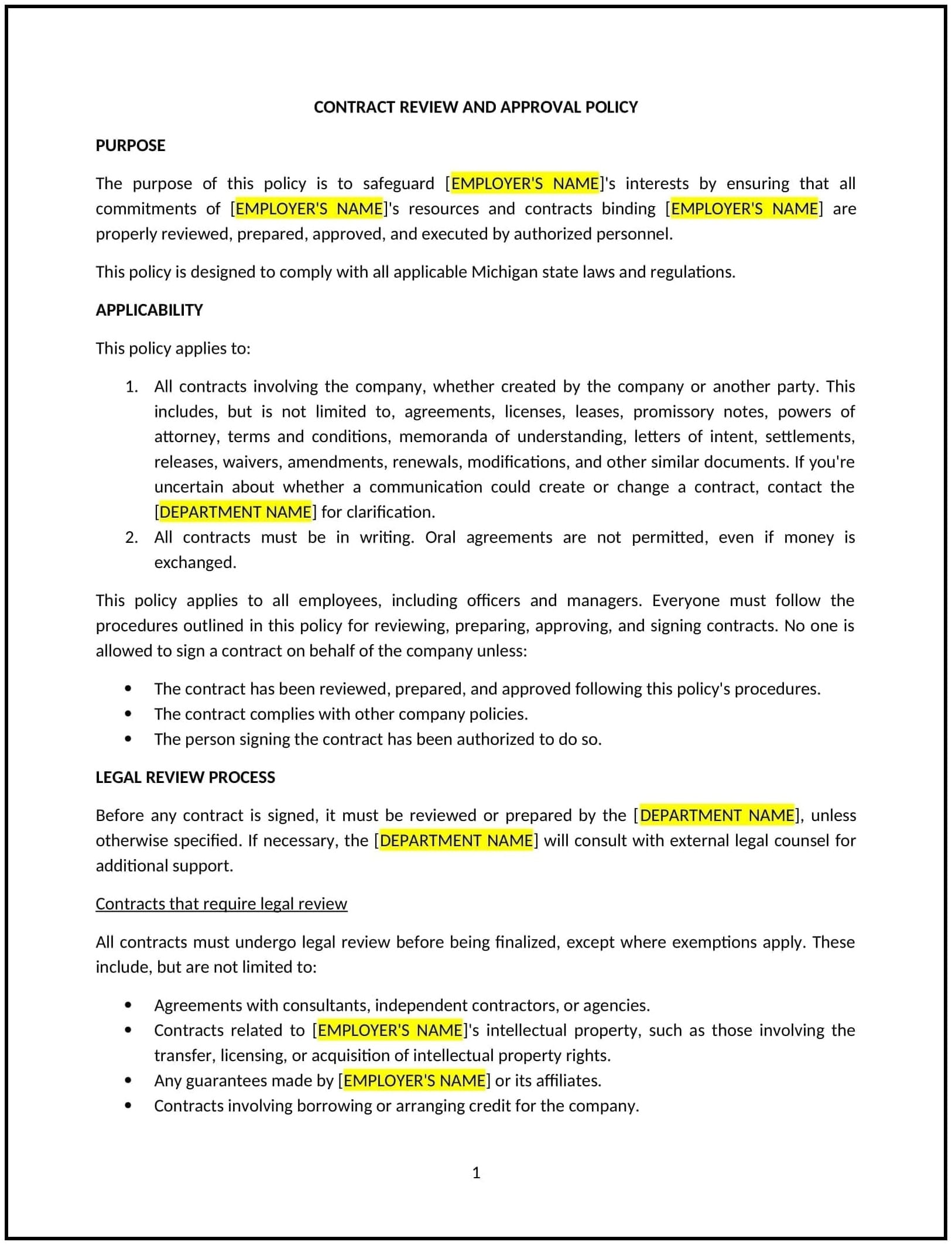Contract review and approval policy (Michigan): Free template
Got contracts to review? While you're here for policies, let Cobrief make contract review effortless—start your free review now.

Customize this template for free
Contract review and approval policy (Michigan)
A contract review and approval policy provides Michigan businesses with guidelines for reviewing and approving contracts before they are executed. This policy ensures that all contracts align with the business’s goals, comply with applicable laws, and protect the organization’s interests.
By adopting this policy, businesses can mitigate legal risks, improve contract management, and ensure that all contractual agreements are thoroughly vetted and approved.
How to use this contract review and approval policy (Michigan)
- Define the scope of contracts: Clearly specify which types of contracts are covered under the policy, such as vendor agreements, employee contracts, partnership agreements, or customer agreements.
- Establish review procedures: Outline the process for reviewing contracts, including the roles and responsibilities of those involved in the review, such as legal, finance, and department heads.
- Set approval authority: Define who within the business has the authority to approve contracts, depending on the value, type, or complexity of the contract, and the process for escalation if needed.
- Identify key elements for review: Specify the key elements that must be reviewed, such as terms and conditions, payment schedules, liabilities, and compliance with applicable laws or regulations.
- Include timelines for review: Set clear expectations for how long the contract review process should take to ensure timely approvals and avoid delays in business operations.
- Address potential risks: Ensure that risks such as indemnification clauses, dispute resolution, and intellectual property rights are carefully reviewed to protect the business.
- Maintain records: Establish procedures for keeping records of reviewed contracts, approvals, and any revisions made during the review process for future reference and auditing purposes.
Benefits of using this contract review and approval policy (Michigan)
This policy provides several key benefits for Michigan businesses:
- Reduces legal risks: By thoroughly reviewing contracts, businesses can identify and mitigate potential legal risks, ensuring agreements are legally sound and fair.
- Promotes efficiency: A standardized review and approval process helps streamline contract management, reducing delays and making the process more efficient.
- Enhances compliance: Ensures that all contracts comply with Michigan laws, federal regulations, and internal business policies, helping to avoid regulatory issues.
- Protects business interests: Thorough contract reviews safeguard the business’s interests by addressing key clauses, such as liabilities, terms of payment, and dispute resolution.
- Supports accountability: A clear approval process promotes accountability within the organization, ensuring that contracts are reviewed by the appropriate parties before execution.
Tips for using this contract review and approval policy (Michigan)
- Communicate the policy: Ensure that all employees involved in contract management are aware of the policy and understand the procedures for reviewing and approving contracts.
- Involve relevant departments: Collaborate with legal, finance, and other relevant departments to ensure that contracts are reviewed comprehensively and that all potential risks are considered.
- Monitor the review process: Track the progress of contract reviews to ensure that all contracts are reviewed and approved within the specified timelines, and address any bottlenecks in the process.
- Review regularly: Periodically review and update the policy to reflect changes in Michigan laws, industry standards, or business operations, ensuring it remains effective.
- Maintain organized records: Ensure that records of contract reviews, approvals, and revisions are properly stored and easily accessible for reference and auditing purposes.